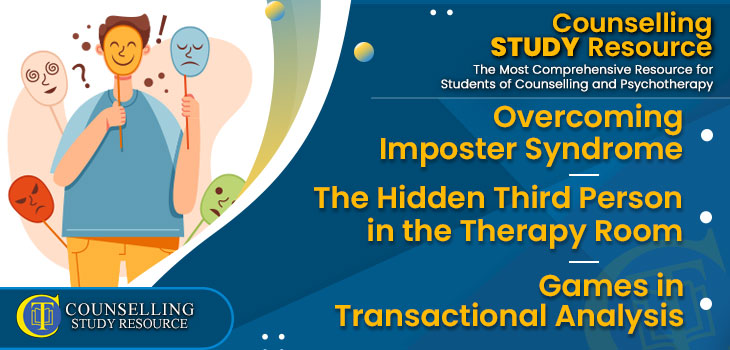280 – Overcoming Imposter Syndrome as a Therapist
The Hidden Third Person in the Therapy Room – Games in Transactional Analysis
NOTE: The Counselling Tutor Podcast is a free resource, which is available on the main Counselling Tutor website. We also place it in CSR for your ease of access. Unlike our other CSR resources, podcast episodes may include presenters’ opinions, and are not intended to be referenced for academic use.
In Episode 280 of the Counselling Tutor Podcast, your hosts Rory Lees-Oakes and Ken Kelly are back with this week’s three topics:
- Firstly in ‘Student Services’, Rory and Ken look at overcoming imposter syndrome as a therapist.
- Then in ‘Ethical, Sustainable Practice’, we discuss the hidden third person in the therapy room.
- And lastly in ‘Practice Matters’, Rory speaks with Lisa Mathurin about games in transactional analysis.
Overcoming Imposter Syndrome as a Therapist [starts at 02:58 mins]
Counselling Foundations is sponsored by
Counselling Skills Academy
Learn counselling techniques by seeing counselling skills used in real sessions by qualified therapists.
Real sessions - real-life presentations - real skills.
Imposter syndrome is something that can affect us all at any stage in our lives. Recognising these feelings of self-doubt is the first step in helping ourselves get past it. In this section, Rory and Ken take us through some signs to look out for, and how we can go about overcoming imposter syndrome as therapists:
- There are multiple ‘Persona Types’ who are more likely to experience imposter syndrome:
- The Expert – someone who feels they know everything, and are thrown off when up against something they don’t.
- The Perfectionist – has impossibly high goals, focuses on weaknesses rather than strengths.
- The Natural Genius – accustomed to being capable in a wide range of tasks, but can feel knocked off course if they find something difficult.
- The Superhero – a high achieving, competitive, workaholic, who can eventually feel burnt out.
- Try to be kinder to yourself.
- Ask yourself if you are exercising the necessary and sufficient conditions. You are doing what you can; the rest is up to the client.
- Imposter syndrome can lead to a change in attitude – are you going into something expecting yourself to not do very well? Do you have very low expectations for yourself?
- It can also lead to people adjusting their behaviour – trying to appear competent and capable, playing a role in their own lives.
- What are some things that can help us overcome imposter syndrome as therapists?
- CBT
- Coaching – introducing a new way to think about your feelings.
- Framing anxiety as excitement.
- Embrace failure.
- Avoid setting unrealistic targets.
- Take time to celebrate your own wins and achievements.
- Don’t measure yourself against others.
A handout on Overcoming Imposter Syndrome is available for download in the green button above.
The Hidden Third Person in the Therapy Room [starts at 22:30 mins]
You might be thinking it is only the client and yourself in your sessions, but it’s important to consider whether you have a hidden third party.
The main points of this section include:
- For some clients, technology in the therapy room can bring up uncomfortable feelings and memories.
- If you have gadgets in the therapy room such as an Alexa, consider unplugging it during sessions to avoid unwanted interruptions.
- At the beginning of a session, you might want to make it clear to a client that you are turning your phone off and putting it away, e.g. in a drawer.
- Even if you don’t believe that your phone, smart speaker, etc. could be listening to your sessions, you don’t know the clients feelings on this.
- This is about controlling the controllable.
- If you’re recording your skills practice as a student, don’t use your mobile phone. It would be best for you to buy a recorder.
- By taking these simple extra steps, we can make the therapy room feel a much safer place, putting the clients’ mind at ease.
- Some clients might not feel comfortable telling you about these concerns, so just this little bit of proactive thoughtfulness can make a big difference to a client.
Games in Transactional Analysis [starts at 39:38 mins]
The National Counselling Society is proud to sponsor Practice Matters.
NCS are really excited to have launched their Children and Young People Therapist Register for counsellors working with the younger age group.
In this week’s ‘Practice Matters’, Rory speaks with Lisa Mathurin on games in transactional analysis.
The key points of this discussion include:
- TA Games are an unconscious process between two people where one person is working to get their needs met. At the end of this interaction, there is usually a negative payoff.
- A simple example might be the act of trying to ‘one-up’ one another.
- TA games can take place because an individual is trying to correct a childhood experience, or is making an attempt to enforce a script belief.
- Another example of a TA game is “How about…?” / “Yes but-”. This game involves someone staying stuck in a position because it is comfortable, rejecting solutions that are offered. They are unable to embrace change or the possibility of it.
- TA games are subconscious patterns of behaviour.
- You might see role reversal within a game – a client may present as a victim, and then possibly take up a persecutory position against the counsellor.
- These games can cause feelings of frustration and incompetence.
- Refusing to ‘play’ these games takes you out of psychological contact with the client, and will impact the therapeutic relationship.
- A. Choy’s ‘Winner’s Triangle’ takes Cartman’s original roles and turns them into something more supportive/positive. E.g. Persecutory into assertive, rescuing into caring/facilitating, and playing victim into sharing vulnerability.


